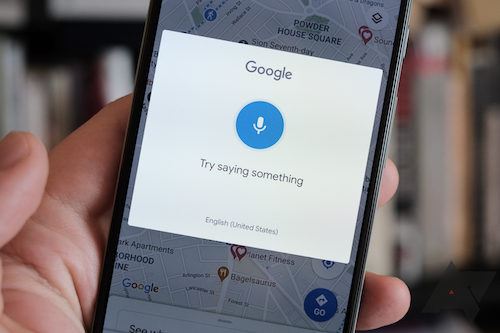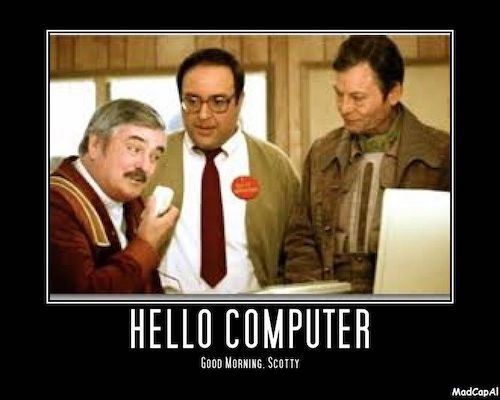I have written often about my vision of the future of computer hardware and software. One thing I am certain of is that today's computer state-of-the-art will not be the same the state-of-the-art in a few years. Just ask anyone who owns a Radio Shack TRS-80 computer or has a collection of floppy disks or even CD-ROM disks. In that vein, I was interested in a survey which predicts that computer keyboards are already being replaced in many cases by voice input.
A survey conducted by Pindrop Solutions queried 4057 consumers in the UK, USA, France, and Germany. According to the survey, nearly half (48 percent) of the general public think keyboards will barely be used by 2023 as voice technology takes over. That's just two years away.
You can read more about the recent Pindrop Solution survey, the lack of keyboards in future computers, and even watch a video about the same subjects, in an article by Greg Nichols on ZDNet's web site at https://zd.net/2IFHP0q.
Of course, I never believe one article, so I went looking for a second opinion. I asked Alexa (Amazon's Echo device). Seeking a third opinion, I asked Google Home (Google's competitor to Alexa). Still not satisfied, I also asked the GPS navigation system in my automobile that is solely voice-controlled.

OK, so I didn't exactly receive clear predictions from any of these computer devices; but, all of them are excellent examples of the direction in which our computing devices are headed. I see four obvious trends: one about voice input replacing keyboards and three other closely-related predictions:
1. Keyboards are becoming less and less popular. New computing devices that depend less on keyboards are therefore becoming more and more popular. While some growth in voice input has occurred on Windows, Macintosh, and Chromebook systems, the largest growth of voice input has been on both mobile computing devices (cell phones, iPad and other tablets, in-automobile uses such as GPS) and similar computing devices that are not used for “traditional” programs like word processing, spreadsheets, and similar operations.
2. Expensive, general-purpose computers (Windows, Macintosh, Linux, etc.) are becoming less and less popular in the home. In fact, the manufacturers if Windows computers have been reporting declining sales numbers for several years now. Macintosh sales are still growing but not as fast as they used to. Instead, Apple’s primary focus these days is on iPads, cell phones, and other specialized computing devices that are not general-purpose computing systems.
Instead, these are being supplemented or sometimes even replaced by cheaper, single-purpose computers designed only for specific tasks. The surge of Chromebooks has proven the interest in cheaper devices that still provide many of the traditional programs, now offered online, but many of these now provide touchscreen input, just like tablets and smartphones. Even more telling, you can purchase a Google Home Mini for about $40, several versions of Amazon Echo (Alexa) devices for about $25. and up, and voice-controlled GPS devices for $150 or so. Even the Waze GPS app is available for Android and iOS “smartphones:” is free and it even includes voice input capabilities. Yet all of these are computers. The difference is that these low-cost computers are designed for limited tasks, not for “general purpose” applications such as spreadsheets, word processing, and other traditional computer applications. Owners of such devices can simply ask their computers to perform common tasks like setting a thermostat or timer, building a shopping list, getting the daily news or weather, and finding the best route to a given destination.
3. Voice control of Windows, Macintosh, and Chromebook computers as well as smartphones already exists. For instance, look at Siri, Cortana, Google Docs, Microsoft Word, Google Voice Typing, Dragon Naturally Speaking, and a number of other products that already convert spoken words into computer commands and text. Today's smartphones (primarily iPhones and Android phones) already have extensive voice input capabilities.
Comment: I grew to love Dragon Naturally Speaking several years ago when I slipped on wet ice, fell forward, and broke both arms. I “wrote” this newsletter through the use of Dragon Naturally Speaking’s voice-to-text conversion for several weeks while both arms were in casts.
I later prevented the problem from happening again by moving to Florida where ice is not a problem.
4. Connections to the cloud are more and more commonplace, and that coverage obviously will become more and more popular every year as the internet continues to expand. More and more devices are now cloud-connected. The result is the computing-intensive tasks, such as converting spoken words into computer commands and text, can be “off-loaded” to very powerful artificial intelligence systems in the cloud with the converted commands and text then returned to the inexpensive cloud-connected devices. The result is cheaper computers for consumers and computing providers alike.
After all, you don’t want to use a $20,000 server in your home to turn the lights off and on. However, thousands of $40 or even cheaper cloud-connecting computing devices in thousands of homes, connected to a single powerful $20,000 server in a remote data center, can be very cost-effective when the expenses are distributed across thousands of users. This is the business model behind Google Home, Amazon Echo (Alexa), Siri, Cortana, and other voice input computing devices.
In short, voice input applications are supplementing and (in some cases) replacing the old-fashioned keyboard-input applications. Indeed, keyboards may someday join floppy disks, CD-ROM disks, and 80-column punch cards in the local computer museum. This probably will happen whether we want it or not.
Did you ever see the Star Trek episode where Scotty encounters a computer from the 1990s, picks up the mouse of that computer, then speaks to the mouse saying, “Hello computer?” The process didn’t work very well for Scotty.

That still remains science fiction today, but we all are getting closer and closer to voice input-controlled computing devices that have no need for keyboards.
Will the conversion happen overnight? Probably not. It will be slowly integrated into our lives and that integration has already started.
Will voice input ever completely replace keyboards? Again, I would say probably not, at least not for a long time yet. However, in many cases, using voice input is easier and safer than using keyboards. For example: I don’t want to be typing on a keyboard while traveling on a superhighway at 70 miles per hour when I need to find where the next rest stop is. Voice input is far safer. Voice input is a great idea for many applications although not for all of them.
Is the slow disappearance of keyboards a good thing? I think so. Then again, I never did learn to touch-type! I much prefer voice input.